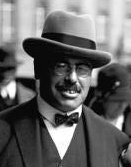A Quote by Rudolf Hilferding
The object of the law of value is to elucidate the actual exchange relations of commodities.
Related Quotes
We don’t go further than what Marx called the exchange value of the actual object - we don’t think about the relations that that object embodies - and were important to the production of that object whether it’s our food or our clothes or our I-pads or all the materials we use to acquire an education at an institution like this. That would really be revolutionary to develop a habit of imagining the human relations and non human relations behind all of the objects that constitute our environment.
The value of any commodity, therefore, to the person who possesses it, and who means not to use or consume it himself, but to exchange it for other commodities, is equal to the quantity of labour which it enables him to purchase or command. Labour, therefore, is the real measure of the exchangeable value of all commodities. The real price of everything, what everything really costs to the man who wants to acquire it, is the toil and trouble of acquiring it.
I have endeavoured to show that the ability to pay taxes depends, not on the gross money value of the mass of commodities, nor on the net money value of the revenue of capitalists and landlords, but on the money value of each man's revenue compared to the money value of the commodities which he usually consumes.
Economists tell us that the 'price' of an object and its 'value' have very little or nothing to do with one another. 'Value' is entirely subjective economic value, anyway while 'price' reflects whatever a buyer is willing to give up to get the object in question, and whatever the seller is willing to accept to give it up. Both are governed by the Law of Marginal Utility, which is actually a law of psychology, rather than economics. For government to attempt to dictate a 'fair price' betrays complete misunderstanding of the entire process.
Money is different from all other commodities: other things being equal, more shoes, or more discoveries of oil or copper benefit society, since they help alleviate natural scarcity. But once a commodity is established as a money on the market, no more money at all is needed. Since the only use of money is for exchange and reckoning, more dollars or pounds or marks in circulation cannot confer a social benefit: they will simply dilute the exchange value of every existing dollar or pound or mark.
Let us consider the actual, worldly Jew - not the Sabbath Jew, as Bauer does, but the everyday Jew. ... What is the worldly religion of the Jew? Huckstering. What is his worldly God? Money. Money is the jealous god of Israel, in face of which no other god may exist. Money degrades all the gods of man - and turns them into commodities. The bill of exchange is the real god of the Jew. His god is only an illusory bill of exchange. The chimerical nationality of the Jew is the nationality of the merchant, of the man of money in general.





























